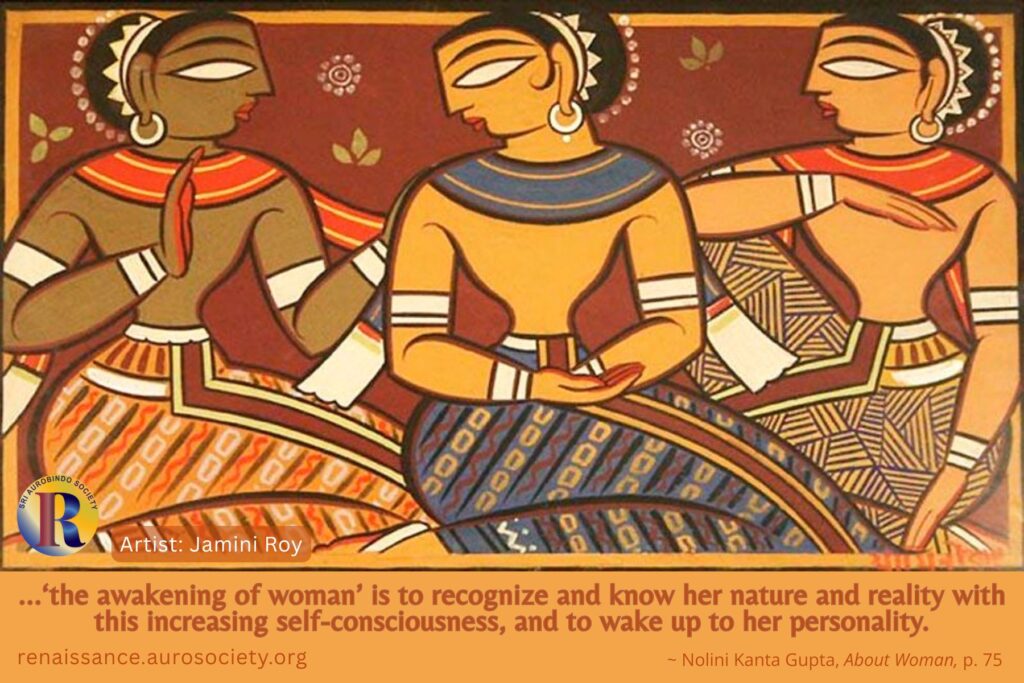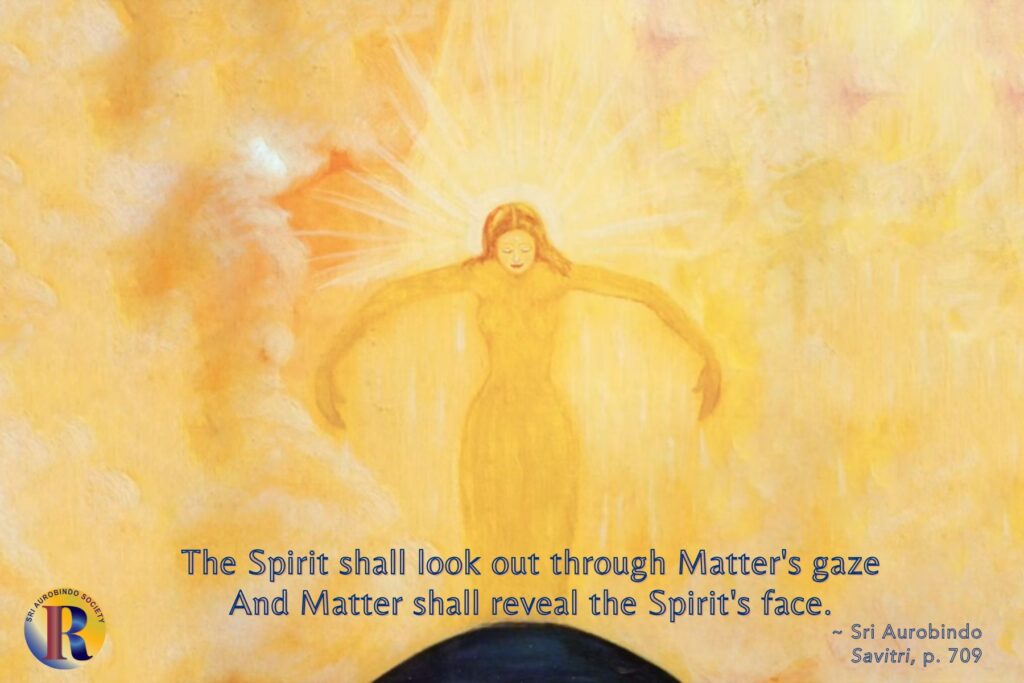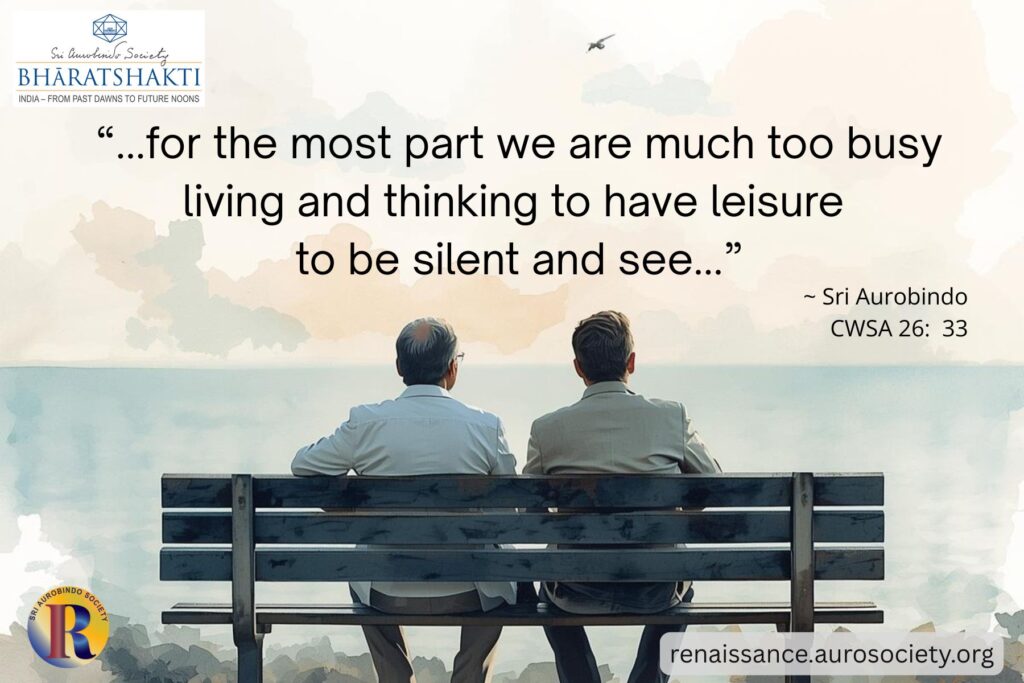Editor’s Note: In the second part of this three-part article, the focus is on nature of the human love and how it gets limited and distorted with impurities such as vital attractions, surface emotions, expectations and possessiveness. The author reminds that true love is self-sufficient and is a source of immutable happiness which simply keeps giving without any expectation. Human love can be taken as a practice ground to expand and purify oneself to receive the universal force of love.

Continued from PART 1
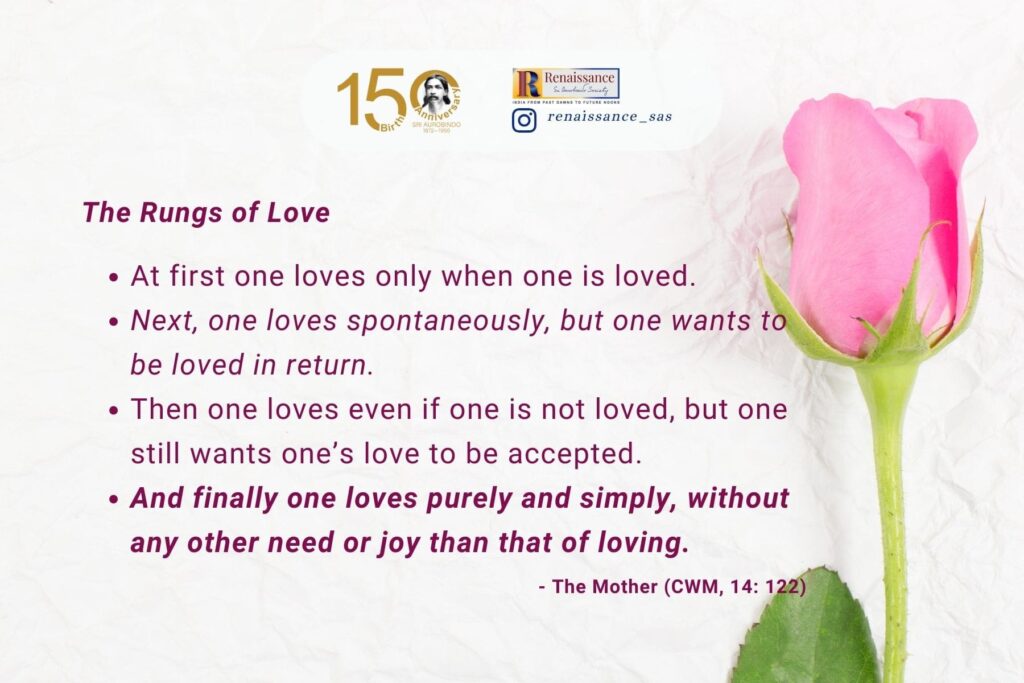
Nature of human love
Human love, says the Mother, “is not a need of the soul, but rather a concession it makes for a time to the ego.” (CWM, Vol. 14, p. 120). This sounds startling to our ordinary intelligence, given that our ideas about love are almost entirely shaped by what our popular culture and popular romantic literature and films tell us about it.
We throw the word ‘soulmate’ so casually, without even realising that we don’t know what is this thing called soul. It is perhaps the false soul of desire in us which creates this illusion.
Ego, an instrument of nature, which gives us a sense of separate existence, also seeks its own separate love, exclusively for itself. This love is coloured by all the different forms in which ego expresses itself, which may be understood as egoism. However, since all love is indeed a universal force, there is not only a similarity but rather an identity between human love and Divine love. At the same time there is much deformity or degradation that love goes through as it manifests in the ordinary human instruments. But how does human love become so narrowly personal and so far removed from a wide, universal Divine love?
The Mother gives an immensely helpful explanation.
Often, the need for human love is simply in obedience to a vital attraction for another, emerging as a natural instinct. But to the extent that it is not that, human love “is the need to have a Divine for oneself alone, at one’s entire and exclusive disposal, a Divine who is one’s personal property and to whom one gives oneself totally only if the gift is reciprocated. Instead of enlarging oneself to the size of the Divine and having a love as vast as the universe, one tries to reduce the Divine to one’s own size and have His love for oneself alone” (CWM, Vol. 14, p. 120).
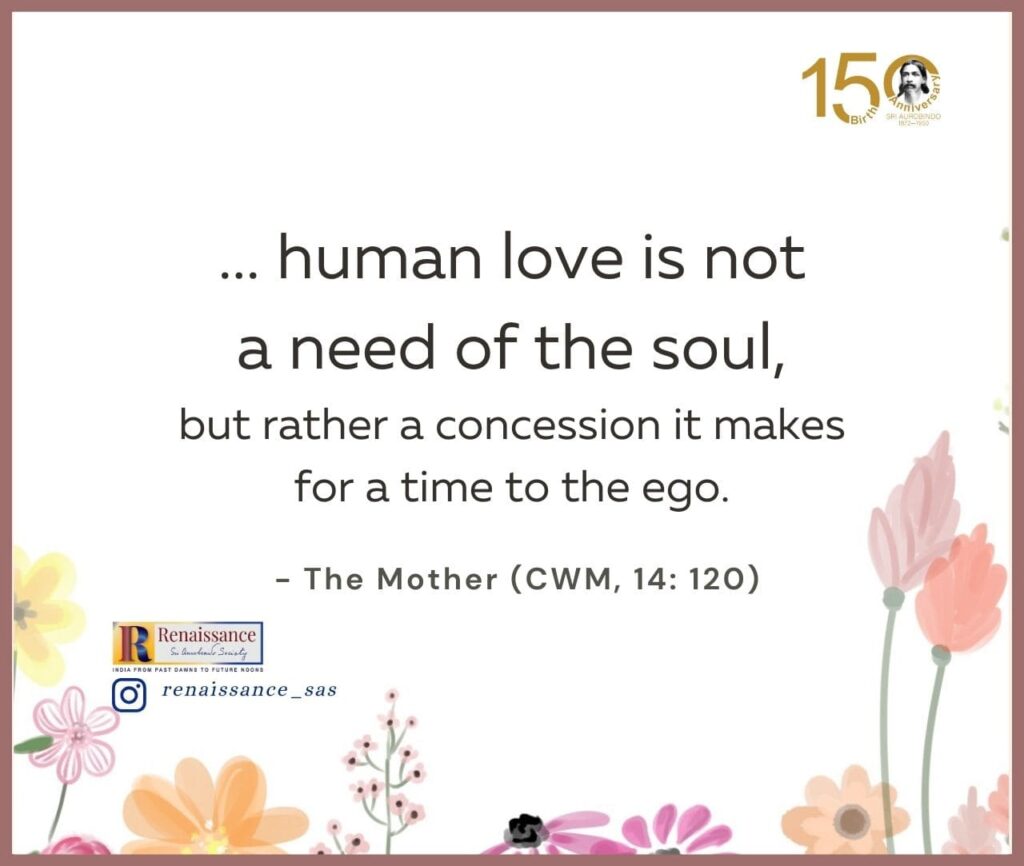
True Love
True love, says the Mother, is something very deep and calm in its intensity. It is not a passion of the ordinary emotive heart, but a psychic quality. More importantly, true love finds its delight and satisfaction in itself. It does not need to manifest itself in any exterior ‘acts of love’, sensational or affectionate.
Most human love is far removed from this true love. Most human beings in ordinary relations speak of their right to be loved, but love’s only right, if at all it has one, is the right of self-giving, says the Mother. Without self-giving there is no love. But an honest self-reflection and observation around us will tell us how rare is true self-giving in human love. In actuality most human love is full of selfishness and demands.
True love simply is! It doesn’t impose itself or demands love in return. It is sufficient by itself. It is a source of immutable happiness. Very rarely does one experience this true love in ordinary life. But here again it is important to remember a note of caution that the Mother adds –
It is not the love that someone feels for you that can make you happy, it is the love you feel for others that makes you happy: for you receive the love that you give from the Divine, who loves eternally and unfailingly.
(CWM, Vol. 14, p. 122)
In other words, it is the love that one simply feels for others, love that one gives to others which can be purified and refined to the status of becoming true, pure love. Because it is only the love that one gives which brings joy and calmness. Love that insists that it needs reciprocation can never be true love.
Read:
Sources of Disharmony in Human Relations
Human nature deforms love
An important point to understand about love is that the distortions and deformations that we see in the apparent workings of the divine force of Love actually belong to its instruments through which it manifests. These limitations of the human instrument range from obscurity and ignorance to selfishness and egoism.
Our sages and seers help us see that all love is essentially a seeking for the union of the self with the Divine.
In its purity, love asks for nothing and is only about giving. The initial movement of love in human beings may carry some sense of purity and divinity. An idea of self-forgetfulness and self-giving may be prominent for some time. But over time the persistent and limited human nature that is full of desires and attachments distort that initial pure movement of love.
This last point is a very common experience with people, almost a universal experience one can say. But the question to ask here is this – why does it happen like this?
The vital part in us, the life-force in us is the seat of all desires, passions, impulses and instincts. When we primarily live in vital consciousness, especially the lower vital, or in other words, when we are primarily ruled by the movements of this vital part in us, we find ourselves getting more attached to our desires and passions, our emotions and feelings.
We are more clinging and lot less generous in our feelings. Our ego is primarily identified with the vital. And it is this vital ego that dictates our responses, behaviour patterns and attitudes toward love. Even our love and liking are egoistic if they are mostly driven by the lower vital which is concerned with small egoistic movements such as lust, greed, jealousy, envy, vanity, pride etc.
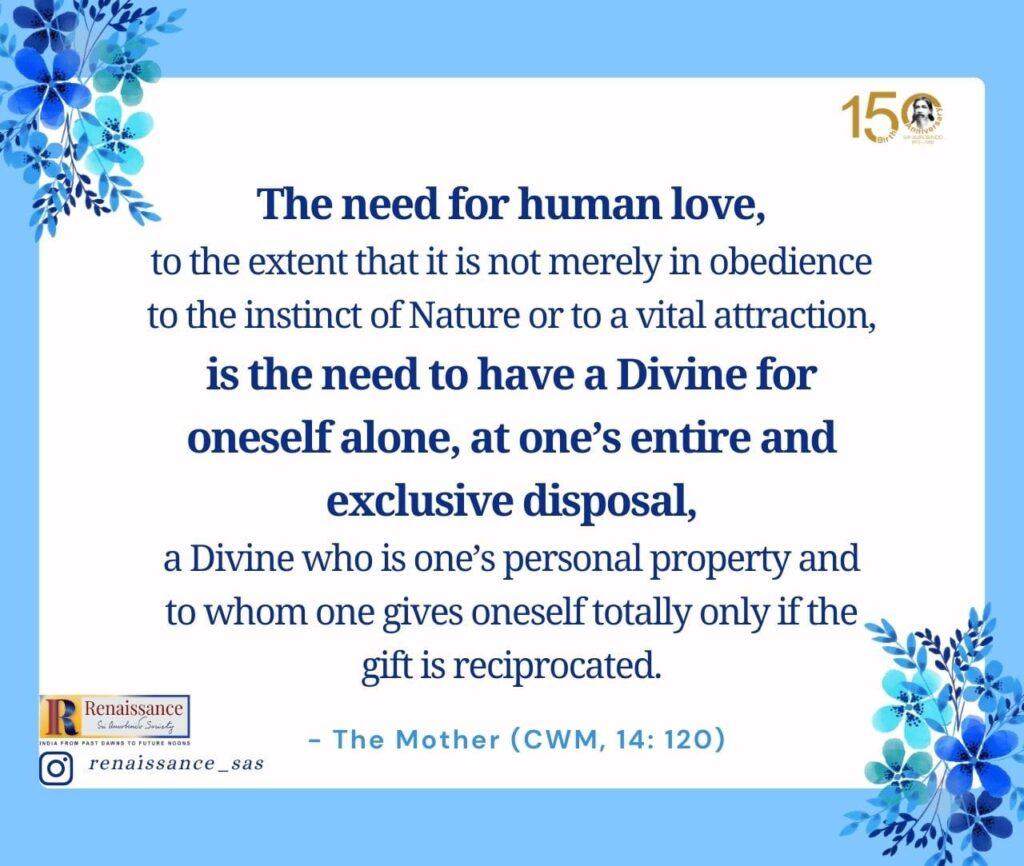
Love is a thing of the heart, it is often said.
In ordinary parlance, what people generally refer to as the heart is simply an emotive heart. It is full of emotions more or less similar to the animal’s, but more variously developed, says Sri Aurobindo. It is important to understand the nature of these emotions. We can then understand how the movement of love whose origin lies in the Supreme Force of Divine Love gets degraded so much at the level of human love.
Sri Aurobindo helps us when he describes further the heart of vital emotion.
Its emotions are governed by egoistic passion, blind instinctive affections and all the play of the life-impulses with their imperfections, perversions, often sordid degradations, — a heart besieged and given over to the lusts, desires, wraths, intense or fierce demands or little greeds and mean pettinesses of an obscure and fallen life force and debased by its slavery to any and every impulse. This mixture of the emotive heart and the sensational hungering vital creates in man a false soul of desire. . .
(CWSA, Vol. 23, p. 150)
This false soul of desire colours the movement of love with its petty instinct of clinging to its object of desire, which it sees as its object of love. And when there is desire, there is bound to be expectation; in this instance, expectation of being loved in return. This is often the beginning of much degradation in love.
Love grows and purifies itself
Love of man, love of woman, love of things, love of thy neighbour, love of thy country, love of animals, love of humanity are all the love of God reflected in these living images. So love and grow mighty to enjoy all, to help all and to love for ever.
– Sri Aurobindo (CWSA, Vol. 12, p. 491)
All love is only one Love, pure and true in its essential nature. It is the imperfection of the human nature that degrades and deforms it by bringing in all sorts of petty vital instincts of possession, jealousy, attachment, lust etc. But as we walk on the path of purifying our vital nature, the love in us also gets purified and grows more and more to its true nature.
At first one loves only when one is loved.
– The Mother (CWM, Vol. 14, p. 122)
Next, one loves spontaneously, but one wants to be loved in return.
Then one loves even if one is not loved, but one still wants one’s love to be accepted.
And finally, one loves purely and simply, without any other need or joy than that of loving.
There is a progressive nature to our inner growth. But it requires sincere effort and an intense aspiration for self-purification.
It can be said that all human love, even in all its deformations is a practice ground for us. Human love also widens and expands as we expand our circle of care and affection – from one single object of love to love for more people, from love for our immediate family to love for the wider community, from love for our community to love for the nation, and from there to love for the humanity and all creatures, love for nature and mother earth.
By such widening we slowly begin to break away from the confines of our limited ego, our separate existence. Even when it is not really a feeling of love for all, the widening of one’s self through sympathy, goodwill, universal benevolence and beneficence, helps one to mentally and emotionally escape from the first limits of one’s ego. This becomes a good preparation for the human instrument in its capacity to love. This is what is meant by gradually becoming more open and receptive to the universal force of love.
Because of the present imperfections of human nature, there are bound to be innumerable sorrows, troubles, regrets, difficulties along the path of love. There is bound to be much pain and agony, much heartache and despair. But if instead of allowing these to cause disappointment in us if we somehow learn to see these as ‘learnings’ on the path of love, we continue to make progress with our work of self-purification and inner growth.
All human love is thus a preparation to experience the divine love.
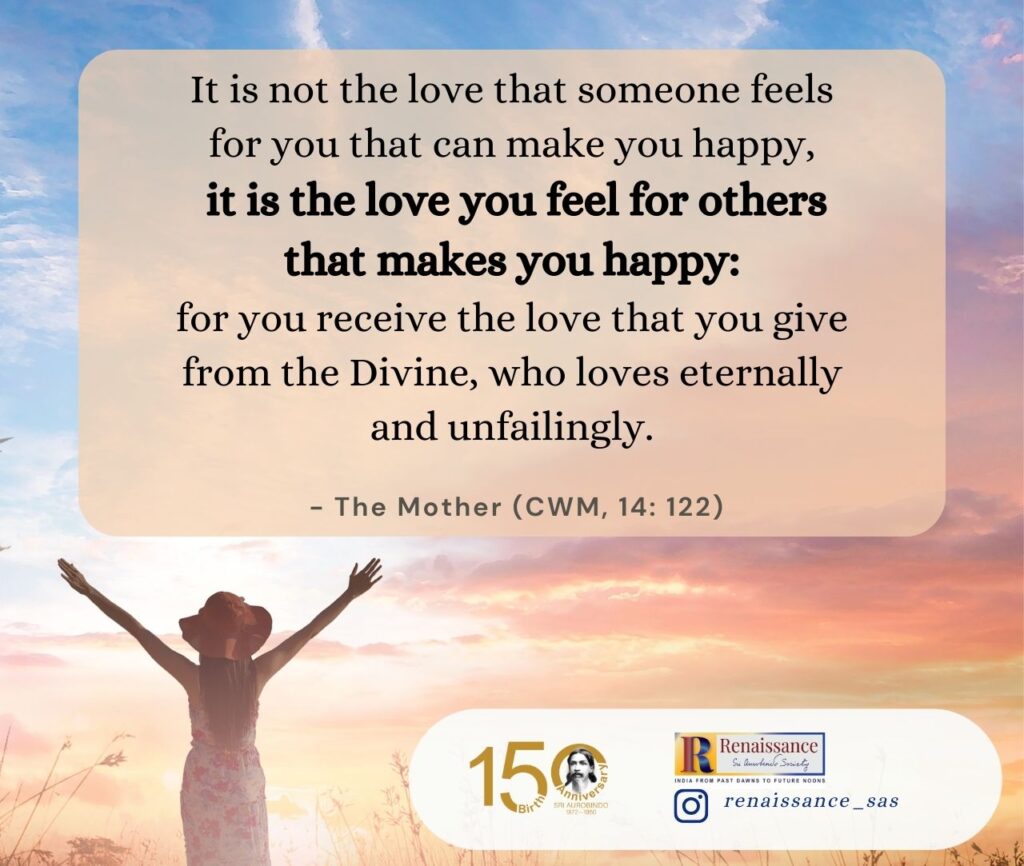
Continue reading in PART 3
~ Design: Raamkumar

